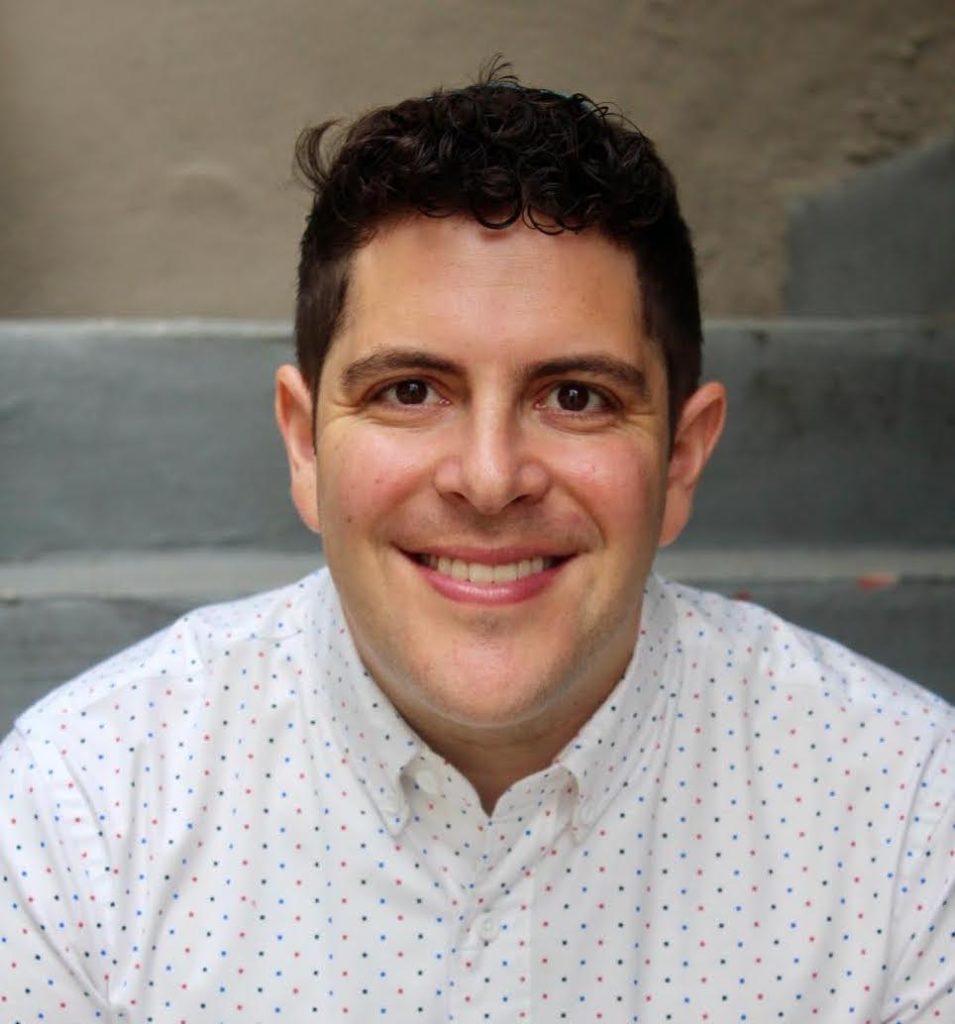
If I asked you what SoulCycle and synagogue have in common, you might look at me like I’m crazy. One is a dark candle-lit room with loud music and a room of sweaty people moving in unison to the beat of the music. The other involves pews and prayers and your fanciest clothing. But these two seemingly random experiences actually share a lot more than meets the eye. You walk out of both with a reinforced sense of connection and community. A spark that makes you want to come back, that makes you feel good, more whole, even transformed. This idea that Judaism, an ancient tradition filled with wisdom, can be applied to modern living in a way that can be as transformational as SoulCycle is one of the realizations that set Sammy Kanter on the path to becoming a rabbi.
Kanter is a rabbinical student at Hebrew Union College, where he is also a Weitzman Fellow with the American Joint Distribution Committee and the Rabbinic Intern at IKAR. He’s on a mission to find out why Judaism is relevant in this day and age.
I spoke with Kanter to learn more about how SoulCycle was the gateway to his spirituality, tips for someone who might be struggling to connect, and how he is now taking his outreach to thousands on Tik Tok.
Tell me about you. Who is Sammy Kanter?
I’m born and raised in Cincinnati, Ohio and I have a lot of deep roots in Cincinnati. All of my family is from there and I grew up very engaged in the Jewish community. When I went off to college, I first went for journalism but then ultimately I decided I wanted to be a theatre producer. I spent a few years after college trying to produce theater, various Broadway and off-Broadway, and also like fringy-type stuff in Ohio. It was a great experience. I had a great time, but ultimately I was looking for something more fulfilling and more meaningful and that could build community in a stronger way. I started being pulled back to Judaism and the Jewish community in ways that I hadn’t thought about as an adult, and ultimately it led to rabbinical school where I am now.

So, what is it that inspired you to go to Hebrew Union College and become a rabbinical student?
I have to give credit to growing up in the Jewish community and opportunities to lead Birthright and go to Israel and all of these things contributed. However, the real spark came when I lived in New York City and I would go to SoulCycle a lot. SoulCycle is a spin class essentially, but it’s a lot more than that. It’s a spiritual experience, it’s about community, it’s about finding your best self. I just found it to be so spiritual. More spiritual than I’d ever found any Jewish space. I even had a routine for a while where I would go on Friday nights at eight o’clock and the teacher, who I adored, her name is Olivia. Not to her face, but I used to call her Rabbi Olivia to my friends because I felt like she was more spiritual than any rabbi I had ever met.
I did that for about a year and I started thinking: this is amazing to build community and have people access spirituality, their best selves, maybe even the divine in some way, but there must be more. SoulCycle is a business at the end of the day. So around that same time, I thought maybe I should see if there’s any sort of Jewish community that could bring you that same level of spirituality that SoulCycle did. There was also something called Daybreaker which was a morning sober rave that I used to go to. I kept thinking, I know that there are more Jews in this room of a certain demographic than are going to every synagogue across New York on a Shabbos… And this is a problem. There needs to be a way that we can connect.
I ended up finding a community called Romemu in New York which I found to be really powerful. It was the combination of those two things that made me think: If SoulCycle has the potential to really transform people as humans and as a community, then this tradition that I’ve been a part of my whole life and that has existed on this planet for over 2000 years and remains strong and vibrant… This surely must offer more. We just have to figure out how to access it and get that out to people. So I thought the best way to do that was to go to rabbinical school.
What motivated you to get on Tik Tok and start creating videos?
Over my winter break, I was bored one day and I downloaded Tik Tok. I was amazed by the potential for real content in ways that Instagram and Facebook don’t really allow… and I didn’t see a lot of real Jewish content off the bat. I saw people that were talking about Jewish identity but I thought that this could maybe be a potential to reach people with real raw Jewish content. So I tried to make a video and I didn’t know what I was doing and it took off in a way. Now, I’m really trying to figure out what it means to use the medium effectively to reach Jews and non-Jews and teach about how Judaism can fit their lives as they are and where they are.
@sdk2086 I want to find out why Judaism is relevant today. So I started a tik tok #jewish #fyp #jewishtiktok #rabbisoftiktok #rabbi #jewishboyy
♬ Alive – Hillel Tigay
What can be the impact of Tik Tok?
I think that it’s important that the content is not just silly. Jewish humor is great and has been our way of assimilation and something that’s lifted and kept our spirits high. But I do think it’s important that people also see Jews as non-funny people. Just as average Jews figuring out their identity, figuring out their lives, and trying to practice holidays or whatever it may be. We need for Jews around the diaspora to really see Jewish life being modeled in creative and new ways.
Even though I’m on social media, I kind of resist Judaism moving totally online because I think that there’s so much more power being in person. With that said, I’ve been on Tik Tok for a month and I’m already thinking about how it’s such a missed opportunity that more meaningful content isn’t there. I see it not as a replacement for the in-person but as an enhancement. If someone is constantly thinking about Judaism or seeing Jewish videos, or learning about what prayer means on Tik Tok, I would argue they are more likely than to walk into a synagogue or a Hillel — or whatever it may be — in the future.
@sdk2086 How do you start your day? #jewish #fyp #rabbi #jewishtiktok #nicejewishboy #nicejewishgay
♬ Modeh Ani – Tal Vaknin
What would you say to someone who might be struggling to figure out how to connect with their Judaism?
That’s a great question, and I wish I had the answer.
I do think that there are a couple of things. One, and maybe first, is that people need to recognize that it’s a journey. It’s constantly evolving and it takes a lot of work. You have to want to seek out an identity and a spirituality and you have to try things out in communities that are both Jewish and spiritual in different ways. Like I said, SoulCycle or Daybreaker or anything that you find to be spiritual. I think that’s the first piece of work on your own that you need to do.
Once you have identified the type of things that resonate with you, where you maybe see the divine or experience holiness, then there’s the opportunity to take a step into Judaism. Discover what resonates with you and discover all sorts of different practices. Now that everything is online and probably will be online to stay in many ways, it opens so many opportunities for people living all over the world. Even if you don’t live in a community or a city where the synagogue is interesting or there’s a dynamic rabbi or leader, you can find it online.
Do you have any final words of wisdom for [readers]?
Judaism doesn’t look a certain way, especially in 2021. I invite you to find or create the Judaism that really fits who you are, what you stand for and who you want to be. I think it exists, and I invite you to go after that. I also invite you to have agency. If it’s not good enough or if it’s boring or if it doesn’t feel relevant, to push relevant people to make it more relevant, or make your own, or go to rabbinical school! There’s so much potential in today’s diaspora Jewish world. I invite you and bless you to have the strength and courage to go on this journey of enriching your life and enriching the Jewish community at the same time.
Originally Published Jun 14, 2021 12:02AM EDT
